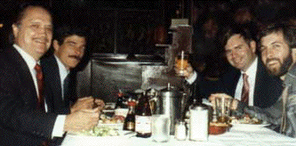
In a previous blog I discussed the first two of ten points with which the eminent psychologist Joseph Rychlak concluded Discovering Free Will and Personal Responsibility. His third point addressed the place of the future in understanding how we live:
3. “The essential human posture is that of futurity. We always create ourselves by arranging future circumstances or allowing them to arrange us." Rychlak made these observations:
- People who live “long, successful lives” have lives of purpose; they live in the present, not in the past.
- The nature of living is that we always live on the edge of the future whether we like it or not. With each breath, the future becomes present and the edge moves. We are always becoming.
- It is possible to be so long-term focused that joy in the present (this day, this week) is lost. The activities of life may be overwhelmingly instrumental, that is, means to ends, such as the successful career or the accumulation of wealth.
- This afternoon, this evening are future events in our lives. We do not think of today as the future because it is immediate -- but it is.
- People who live in the present are affirming the “spontaneously emerging events” in their days, such as finding excitement or challenge, relaxing or enjoying friendship.
- “The secret of happy living” is being in the journey, enjoying each season as it passes, tasting the fruits of each.
- To maximize our human potential, we must always be asking ourselves, “What am I becoming?” “Where is this taking me?”
My take-aways:
1. I find these perspectives profound. For example, imagine being in the moment of each day, finding joy in simple pleasures, framing the meaning you give to your work in such a way that the instrumental becomes intrinsic. The onerous task becomes challenging. The tough workload becomes a learning experience, a growth experience. We choose how we frame and give meaning to our experiences.
2. Do we make it through the day to just get through the day? Are we waiting to live our lives, or are we living our lives? This will vary from person to person, but there are organizations with cultures where people are more likely to be living their lives. If you are a leader, do you know how meaningful employees find their work? Are there things you can change? Leaders have tough but exciting days. It is easy to assume this is the same for everyone.
3. Such great questions! “What am I becoming?” Do I put this on my bathroom mirror, my refrigerator, my desk, or all three. What are you becoming?
The image is from my collection. From left to right, Joe Rychlak, Jim Lamiell, myself, and Brent Slife, New York, 1987.
Rychlak, J. F. (1979). Discovering free will and personal responsibility. New York: Oxford University Press.
 RSS Feed
RSS Feed